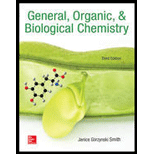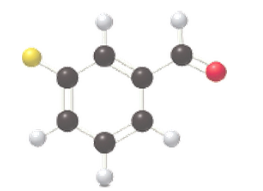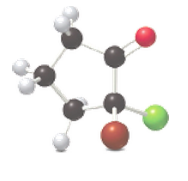
Concept explainers
(a)
Interpretation:
The name of the following carbonyl compound depicted in the ball and the stick model is to be determined.

Concept Introduction:
While naming the
(b)
Interpretation:
The name of the following carbonyl compound depicted in the ball and the stick model is to be determined.

Concept Introduction:
While naming the aldehydes as per the IUPAC nomenclature, the naming of the compounds is done by adding a suffix-al in the end of the name. Firstly, one will find the longest chain that contains the -CHO group and then change the -e ending of the parent alkane chain to -al suffix. Then, the numbering of the chain or the ring is done in such a way that the carbonyl group is given the lowest possible number. Thereafter, apply all other rules of nomenclature as usual.
Want to see the full answer?
Check out a sample textbook solution
Chapter 16 Solutions
EBK GENERAL, ORGANIC, & BIOLOGICAL CHEM
- What ester and Grignard reagent are needed to prepare each alcohol?arrow_forwardWhich compound in each pair has the higher boiling point? Он a. or b. or A.arrow_forwardAnswer each question for A and B depicted in the ball-and-stick models.a. What is the IUPAC name for each compound?b. What product is formed when each compound is treated with NaOH?c. Name the products formed in part (b).d. Draw the structure of an isomer that is at least 105 times less acidic than each compound.arrow_forward
- Safrole is a naturally occurring acetal isolated from sassafras plants. Once used as a common food additive in root beer and other beverages, it is now banned because it is carcinogenic. What compounds are formed when safrole is hydrolyzed with aqueous acid? safrolearrow_forwardWhat carbonyl compound and diol are needed to prepare each compound? b.arrow_forward18. Identify the lactone formed by the following hydroxy carboxylic acid. A. A B. B C. C D. D OH OH & & A) B) C) D)arrow_forward
- 10.38 Give the IUPAC name for each compound. a. b. C. d. e. OH f. OHarrow_forwardLabel each of the following structures as a cyclic hemiacetal, hemiketal, acetal, ketal, or none of these: a. b. c.arrow_forwardLabel each of the following structures as a hemiacetal, hemiketal, acetal, ketal, or none of these: a. c. b.arrow_forward
 Chemistry for Today: General, Organic, and Bioche...ChemistryISBN:9781305960060Author:Spencer L. Seager, Michael R. Slabaugh, Maren S. HansenPublisher:Cengage Learning
Chemistry for Today: General, Organic, and Bioche...ChemistryISBN:9781305960060Author:Spencer L. Seager, Michael R. Slabaugh, Maren S. HansenPublisher:Cengage Learning Organic ChemistryChemistryISBN:9781305580350Author:William H. Brown, Brent L. Iverson, Eric Anslyn, Christopher S. FootePublisher:Cengage Learning
Organic ChemistryChemistryISBN:9781305580350Author:William H. Brown, Brent L. Iverson, Eric Anslyn, Christopher S. FootePublisher:Cengage Learning Organic Chemistry: A Guided InquiryChemistryISBN:9780618974122Author:Andrei StraumanisPublisher:Cengage Learning
Organic Chemistry: A Guided InquiryChemistryISBN:9780618974122Author:Andrei StraumanisPublisher:Cengage Learning


